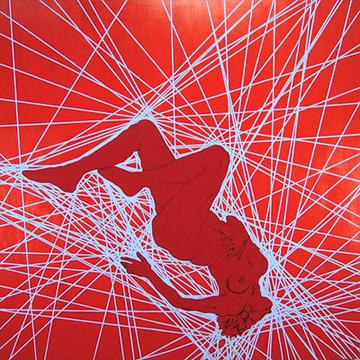
Desire — Justin Simoni
That was no beast that stirred,
That was my heart you heard
Pacing to and fro
In the ambush of my desire.
To the music my flute let fall.
– “Neither Spirit Nor Bird” (Shoshone Love Song), trans. Mary Austin
The Tao is infinite, eternal.
Why is it eternal?
It was never born;
thus it can never die.
Why is it infinite?
It has no desires for itself;
thus it is present for all beings.
The Master stays behind;
that is why she is ahead.
She is detached from all things;
that is why she is one with them.
Because she has let go of herself,
she is perfectly fulfilled.
— Tao Te Ching: Chapter 7
translated by Stephen Mitchell
Heaven and Earth last for ever.
Why do Heaven and Earth last for ever?
They are unborn,
So ever living.
The sage stays behind, thus he is ahead.
He is detached, thus at one with all.
Through selfless action, he attains fulfillment.
— translated by Gia-fu Feng and Jane English
Transcending the ego is equivalent to transcending suffering. Your ego, which is your false self, keeps you identified with your mind. The ego keeps you tied in thinking about your past and it also makes you think about the future. The ego wants you to be anywhere other than where you are at this moment. The ego makes you believe that something is lacking in this current moment that is keeping you from being at peace. Maybe you believe that you need a new car or a dog or a shirt in order to feel better. There is nothing wrong with purchasing any of these things or wanting any of these things but if you believe that they will make you feel better then the desire is probably ego-based. Unfortunately, under the rein of the ego you will never be at peace and you will never transcend suffering.
The ego is the source of desire. When you remove desire you can remove the ego. This is definitely easier said than done; however, just being aware of the impact your ego will help to remove its grip in your life.
The next two hindrances are raga (attachment, desire) and dvesha (aversion). Within these are the more specific hindrances of attachment to pleasure, or sukha, and aversion to pain, or duhkha. Sukha and duhkha in themselves are simply natural human reactions. Sukha and duhkha become raga and dvesha when attachment is present, for it is in the attachment to pleasure and the aversion to pain that we get into trouble. — Rolf Gates, Meditations from the Mat
“The man whom desires enter as rivers flow into the sea, filled yet always unmoving — that man finds lasting peace.” — Bhagavad Gita
So much desire in the world today
So much of everything you can’t give it away
You could be happy but you’re feeling so bad
About what you never have
Because you can’t look at nothing without wanting it
And you know that’s the truth
There’s always some scene you think you got to break into
Or a new sensation to intoxicate you
Ain’t it a drag
Staring through the glass at something doesn’t touch you really
Or bring you laughter or roses or stroke your hair so tenderly
Desire
Stealing you away from me
Desire
You’re living in a dream
Desire
Is getting the best of you…
Who was it told you
You have to have everything you see
Same one who sold you that last fantasy
Roll up your sleeves and use those hands for something
That’s gonna work for you baby
To fill your arms and your heart with joy
No Responses